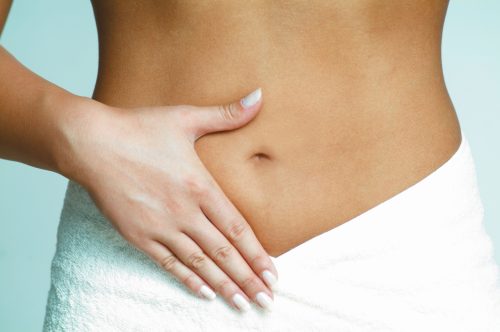
Most of us have experienced some sort of tummy trouble at one time or another. Irritable Bowel Syndrome is becoming more and more common. How do you know if something is really wrong?
Irritable bowel syndrome (IBS) is the most common of the digestive disorders. Generally IBS affects women more than men: in Britain and the United States it has been estimated that IBS affects between 14-24% of women and between 5-19% of men. Studies suggest that the frequency of IBS is lower amongst older people. Although there is not the same data available from non-western countries, it seems that IBS is virtually unknown in sub-Saharan Africa, but is common in countries like Japan, China, India and South American countries.
There are no structural problems with IBS – investigations by X-ray, sigmoidoscopy or colonoscopy show no abnormalities – and there are no biochemical abnormalities; IBS is known as a functional disorder. As symptoms are common to a number of other disorders, IBS is generally diagnosed by a process of elimination of other possible causes; in other words, more serious disorders are ruled out first.
What is IBS?
IBS occurs when the bowel’s normal rhythmical waves go into spasms; it is sometimes called irritable or spastic colon. Symptoms of IBS can include bloating, excess wind, constipation, diarrhoea, cramping and abdominal pain.
There are two recognised types of IBS:
- Pain predominant: The most usual syndrome includes abdominal pain plus constipation which often alternates with episodes of diarrhoea.
- Diarrhoea predominant: Less common is painless diarrhoea.
As the diagnosis of IBS is made by excluding other disorders, and many expensive procedures can be used in these investigations, a lot of work has been done to diagnose it more quickly. An international panel of experts, who met in Rome, came up with what is known as the ‘Rome criteria’ for identifying IBS (see below)
It is important never to self-diagnose: if you think you may have IBS, see your GP in the first instance so that other disorders can be eliminated. You may then be referred to a dietitian for assistance with managing your diet and eating patterns. It’s a good idea to keep a diary for at least a week before you see the dietitian. Record: when and what you eat and drink and the amounts; physical activity; as well as symptoms you have. This will be a good starting point for the dietitian to discuss what’s going on and suggest changes that may help.
The Rome criteria for IBS
At least three months of continuous or recurrent symptoms consisting of:
Abdominal pain which is:
- relieved by defecation, or
- associated with a change in stool consistency, or
- associated with a change in stool frequency
With two or more of the following on at least a quarter of occasions or days:
- altered stool frequency (>3 times a day or <3 times a week)
- altered stool form (lumpy/hard or loose/watery)
- altered stool passage (straining, urgency or feeling of incomplete evacuation)
- passage of mucous
- bloating or abdominal distension
These criteria are used alongside a physical examination, blood and other tests to screen for other diseases.
What causes IBS?
The cause, or causes, of IBS are unclear but stress, diet, physical activity and hormonal changes can all trigger the symptoms.
Stress
Anxiety can affect the speed with which food is processed in the gut. For people with IBS their digestive tract is hypersensitive to stress, so learning to manage stress and anxiety is an important part of relieving the symptoms. Reduce stress in your life by ensuring you get regular exercise and adequate sleep; learn relaxation techniques like deep breathing, visualisation, self-hypnosis or muscle relaxation exercises. There are classes, books or tapes that can help; it’s a matter of finding something that suits you. (For more on stress, see Eating to reduce your stress.)
Diet
Although it is believed that IBS is not caused by particular foods, some foods may exacerbate its symptoms.
Foods often cited are: fried foods, dried beans, caffeine-containing drinks, carbonated drinks, alcohol, cabbage family vegetables (broccoli, cauliflower, cabbage, Brussels sprouts), sugar alcohols (sorbitol and mannitol found in some sugar-free drinks or gum), fructose (in fruits and fruit juices), and lactose (in dairy products). Responses to specific foods are highly variable.
Physical activity
For some people, ‘bouncy’ activities like aerobics or jogging can exacerbate symptoms. Try ‘gentler’ ways to exercise like walking, swimming, yoga, Pilates or even weights. For some people, gentle exercises also help with pain management, even if it’s only a diversion.
Hormonal changes
For some women, symptoms are worse around their periods due to the hormonal changes.
Gut symptoms to see your doctor about
- Pain before, during or after going to the toilet
- Faecal incontinence
- An altered bowel habit that you can’t account for
- Persistent diarrhoea or constipation
- Blood or mucus in your stools
- Severe abdominal pain
- Vomiting
- Significant unexplained weight loss
What to eat and what not to eat
There is no single ‘ideal’ diet for everyone with IBS and the type of foods recommended largely depends on the symptoms being experienced. Everyone, however, should aim to eat a balanced diet. If constipation is a problem then it can be helpful to include plenty of fibre in the diet. But for some people having a high-fibre intake makes symptoms worse; if you suffer from diarrhoea you might find it helpful to reduce fibre intake.
Some foods may aggravate your symptoms. If you do find a certain food affects you adversely, limit eating that food while your symptoms are bad and reintroduce it slowly when your bowel habits are more regular. Make sure you don’t cut out whole food groups though (such as dairy foods) as this could leave you short of important nutrients.
Other treatment
There is no cure for IBS; the goal of treatment is to relieve the symptoms. Generally people with mild symptoms can learn to manage it by focusing on their diet and managing stress. Those with more severe symptoms usually respond to prescribed antispasmodic drugs which give pain relief, or low-dose anti-depressants which decrease the sensitivity of the intestine. Sometimes specific medications are prescribed to assist with the constipation or diarrhoea.
Peppermint oil taken as a capsule has been suggested as a treatment which may help IBS by decreasing muscle spasm in the gut. A few small scientific studies have shown positive results. There is not enough evidence at this stage to recommend using peppermint oil and anyone trying it should be aware that heartburn is a common side effect, so care is advised.
There has been little research on any other remedies for the symptoms of IBS. Remember never to take herbal or other remedies, and that includes seemingly innocuous things like garlic tablets, without talking to your doctor about potential interactions with prescribed medications.
Inflammatory bowel disease: What’s the difference between this and IBS?
Inflammatory bowel disease (IBD) is not IBS! The inflammatory bowel diseases are Crohn’s disease and ulcerative colitis. Both are chronic diseases.
Crohn’s disease is an inflammation of all of the layers of the digestive tract, and can occur anywhere from the mouth to the anus, although it most commonly occurs in the small intestine.
Ulcerative colitis only occurs in the large intestine (colon) or rectum and is an inflammation of only the inner lining of these.
Crohn’s disease can have a wider range of symptoms but the treatment and dietary advice is similar for both.
Bloating
Abdominal bloating is when the abdomen feels full and tight. Bloating can have a number of causes but the most common is the accumulation of intestinal gas. It can happen as a result of overeating, or may be a result of food intolerance, for example lactose intolerance.
Irritable bowel syndrome (IBS) may be a cause, or constipation. Alternatively it may simply be the result of swallowing air (from gulping down food or drinks) or consumption of gas-producing foods.
To prevent the problem the cause needs to be identified, but generally it can be helpful to avoid eating too much in one go. If you do suffer from an intolerance then steer clear of causative foods and follow the guidelines for the relief of constipation or IBS outlined here.
Constipation: Why it might be hard to go
- Not enough fibre in your diet
- A sudden change in your diet
- Not enough exercise
- Illness
- Pregnancy
- Disorders of the bowel (which may require medical attention)
- Side effect of some medications
- Emotional upset
- Stress
- Long-term reliance on laxatives
Important: Allow enough time to go to the toilet and not to hurry; ignoring the urge to go to the toilet can be a cause of constipation. This is particularly important for children who often don’t want to miss out on what’s going on around them.
The bottom line
All too often, when you have a digestive disorder you can find yourself eating to survive rather than relishing your food. It doesn’t have to be this way. Food should be enjoyed, and by including the right balance of food choices in the right quantities, meals can be pleasurable and healthful, rather than painful or uncomfortable. For the best digestive health, think about food choices, portion sizes and meal timings. Also important are lifestyle factors such as avoiding smoking, managing stress, limiting alcohol intake and keeping active. And if you are worried about your symptoms, seek professional help.
www.healthyfood.com











